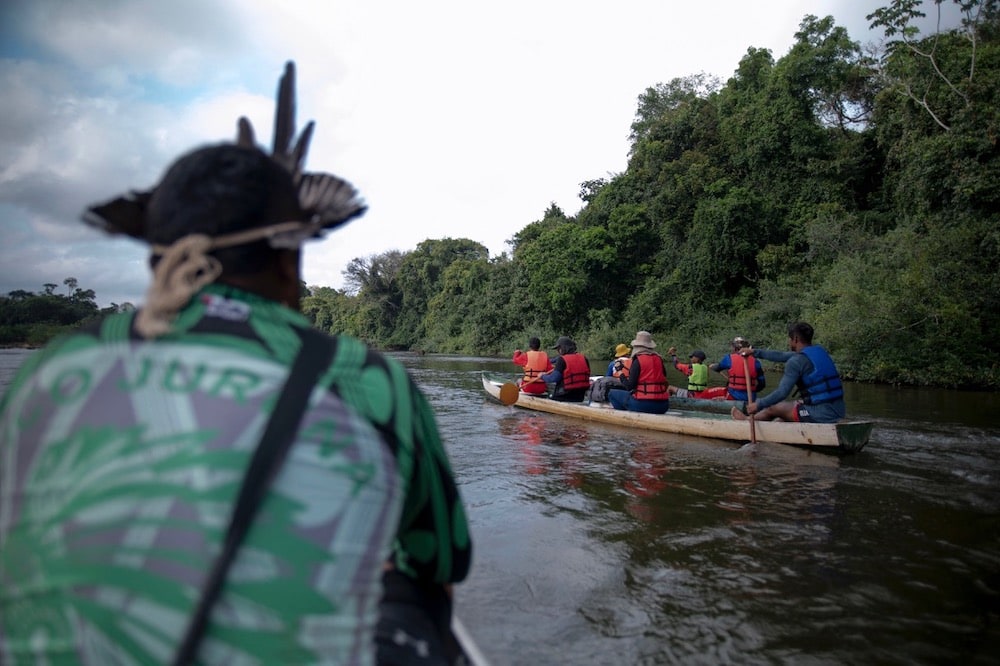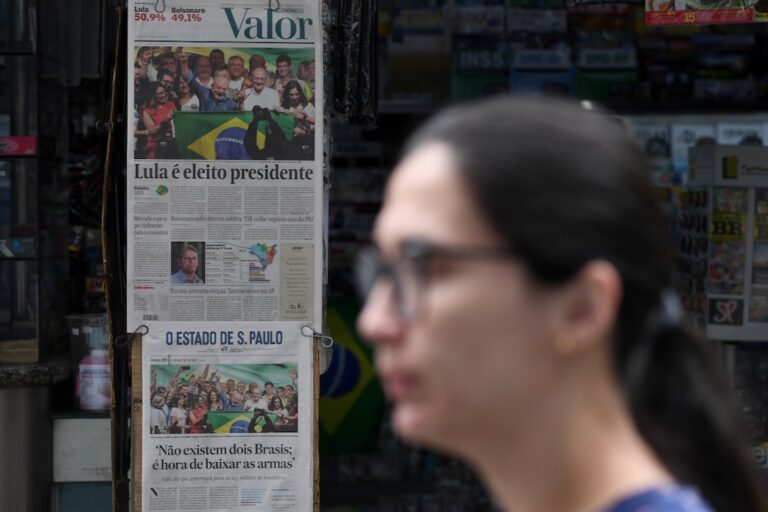Whether farmers, livestock breeders, loggers, gold miners or mining company executives, those who monopolise land and natural resources seek to silence anyone reporting on violations of human rights and environmental legislation.
This statement was originally published on rsf.org on 21 September 2023.
Reporters Without Borders (RSF) is releasing a report entitled “Scorched lands of journalism in the Amazon” containing previously unpublished data on the obstacles to press freedom, particularly for local journalists, in the Brazilian Amazon, a region at the heart of the global climate challenge.
The Amazon contains some of the greatest biodiversity on the planet and plays an essential role in stabilising the global climate. The urgent need for action, especially to rein in deforestation, requires journalistic freedom and pluralism but clashes with the economic interests of many stakeholders. Whether farmers, livestock breeders, loggers, gold miners or mining company executives, those who monopolise land and natural resources seek to silence anyone reporting on violations of human rights and environmental legislation.
What with harassment, threats and physical violence, reporters in the Amazon have “a target on their back.” From 30 June 2022 to 30 June 2023, RSF identified 66 press freedom violations in the Brazilian Amazon’s nine states – violations that reveal the dynamics of the violence underlying the hostility to coverage of social and environmental issues. The region’s endemic violence, combined with political and economic pressures, creates conditions that push journalists to censor themselves.
Journalists and media also face structural challenges specific to the Amazon that include the logistical complexity of travel and communication, highly concentrated media ownership and local government and private sector interference in media content. Funding for independent journalism, especially local independent journalism, is limited. This holds back the development of a diverse and sustainable media ecosystem and opens the way to disinformation.
“To understand what is happening at the front lines of one of the most important conflicts of our time, we need reliable reporting direct from the field. In other words, the defence of free, diverse and independent local journalism in the Amazon must be an integral part of efforts to address the climate emergency. RSF will continue to monitor attacks against the media, with a focus on the situation in the Brazilian Amazon, in order to mobilise public and private sector stakeholders around the global importance of the role of local journalists, who provide essential reporting with almost no resources or recognition”
Artur Romeu, Director of RSF’s Latin America desk
The report follows the various stages of the investigation into the murders of Dom Phillips and Bruno Pereira in the Javari Valley, in Amazonas state, in June 2022, a few weeks before the start of this survey – murders that starkly highlight the challenge of protecting the region’s journalists, who continue to be threatened.
It also describes the steps being taken by local media and journalists to address the challenges they face. For example, to combat disinformation and to cover what is happening in indigenous territories and places that are hard to access, journalists and local information providers are organising and networking in order to be able to protect themselves and keep working. Finally, the report offers recommendations for consolidating a reliable and diverse media ecosystem in the region.
Five key points in the report:
- Forbidden subjects
Of the 66 press freedom violations – cases of harassment, threats and physical attacks documented from 30 June 2022 to 30 June 2023 in the nine states of the Brazilian Amazon by an RSF-created observatory consisting of journalists and civil society groups – 16 were directly linked to coverage of agribusiness, mining, indigenous peoples and human rights violations. Even when it is not the central subject of the reporting, the environment is present in many of the political subjects covered in the Amazon. A third of the violations took place during the 2022 presidential elections.
- Self-censoring as a safety reflex
A history of deadly land conflicts and use of violence to silence dissent contributes to the intimidation of independent journalists and media. This hostile environment fosters self-censorship as a way to avoid being threatened and attacked by government officials and private sector businessmen in an environment marked by the absence of policies for preventing violence against the media, protecting reporters and promoting journalism.
- Political and economic interference
Press freedom and the right to news and information in the Amazon are structurally limited by an economically stifling environment. Local journalists report being under constant pressure from public and private sector donors to pursue editorial policies that favour the donors’ interests. The viability of independent media is a major challenge. This ends up facilitating disinformation campaigns and propaganda.
- Geographical and infrastructural challenges
The complexity of travel in the Amazon, often involving transport by land, river and air, results in significant costs. Many stories are killed because media outlets lack the resources to launch or pursue a journalistic investigation. Inequalities with regard to new technologies, Internet connections and phone networks further complicate the media’s work.
- Response in the field
Faced by threats and violence coming from public and private sectors, journalists in the Amazon have to be inventive in order to protect themselves and to cover what is happening in this vast territory’s different isolated areas. Both collaboration at an international level and reinforcement of local networks are playing a leading role. This report reveals innovative journalistic practices that are getting help from civil society.
RSF’s five recommendations for an environment more favourable to journalism in the Brazilian Amazon:
- Put the defence of reliable, independent and diverse journalism at the heart of environmental defence programmes in the Amazon;
- Develop prevention and protection policies for journalists working on sensitive stories in the region;
- Promote a diverse and financially viable media ecosystem;
- Reinforce media education and efforts to combat disinformation in the Amazon
- Extend the work of monitoring abuses against journalists in the region



